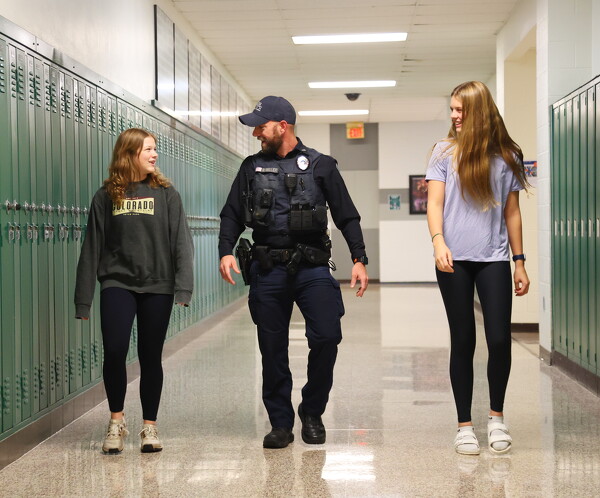
Celina patrolman Nate Miller walks with Aliya Avers, left, and Lilly Shreffler, right, last year.
CELINA - City and school leaders want to extend a partnership that has placed a Celina police officer in Celina City School for the last three schools years, yielding positive results.
However, with new police union agreements in place, it will come at a steep cost of roughly $113,000 a year, according to Celina Police Chief Tom Wale.
Under the soon-to-expire city-school agreement, the district paid the city 75% of the school resource officer's total compensation and benefits, which were pegged at $91,233 for school year 2021-2022. The district's share came from federal Elementary and Secondary School Emergency Relief grant funds.
Wanting to renew the arrangement, school officials asked the city to apply for a federal COPS Hiring Program grant that would cover up to $125,00 of an entry-level officer's salaries and benefits over a three-year period, far short of the total personnel expenses to be incurred during that time span.
The grant also requires a minimal 25% local cash match, unless a waiver is approved. This cost would fall to the schools.
The COPS Hiring Program grant is open to law enforcement agencies, not school districts.
"The last grant the school got, they could apply for it. It was a special school grant," said Celina Mayor Jeff Hazel. "This is the only thing that was available this time around, as I understand, which is why they sent it to us."
City councilors at a recent special meeting complied with the request, passing a resolution authorizing the police department to apply for the grant. They suspended the rules requiring three public readings to meet the June 12 application deadline.
"This would help us to supplement the cost of that position for school resource officer," Wale said. "The school met with the mayor and the safety service director and I a few weeks ago. They're very strongly supportive. They want the school resource officer. They suggested this particular grant."
Should the police department land the federal grant, the remaining costs to assign a police officer to work as SRO would be negotiated between city administrators and school officials, Wale said.
"They did indicate they were amicable to up to 100% of the cost if money can be found for that," Wale told councilors. "We'll apply for the grant to help ease that pain on them, but if they want the officer they're going to have to pay for it."
Councilman Eric Clausen asked if county government funds would be available for the SRO position.
"A lot of these kids come from outside the city, they go to school here. Is there some county money involved in this or should there be?" Clausen asked.
Hazel replied that only the school could be assessed for an SRO. He also noted that the school could apply for state certification to hire their own officers.
"The grant language is really based on nine months of school, three months off. But the schools are going to where they would like to have the officer there longer," Hazel said. "We have talked to them about the potential whether they get certified, hire their own police officers, because it doesn't make sense for us to hire an officer and then go somewhere else - which is why they would need to pay that cost."
Some councilors voiced support for continuing the SRO program.
"I'm all in favor of a school resource officer. I just want to make sure with our shortage of police, too, that we have enough officers around and that we still have the control, too, when we need an officer," said councilman Thomas Sanford.
Under the current agreement, an officer can be pulled from the school if needed elsewhere, Wale said. A new contract would have to be negotiated with the school.
"The thing is that they're going to be covering 100% of the cost minus the grant. I'm not sure how that contract would be negotiated. That's again up to city administration how they want to negotiate a contract," Wale explained.
Hazel assured Sanford that a SRO would be able to respond to calls outside school.
"It would still be such that if we needed that officer, we call, they come," Hazel said. "That will always be the issue, and I do like a school resource officer. I think it does have a lot of value but there does have to be a cost."
"I certainly think in today's environment that a resource officer would be a good thing," councilman Mark Fleck said.
Councilman Eric Baltzell seconded that viewpoint, saying a SRO is a great thing for the community.
"A lot of what they offer is just preemptive, like building those relationships, helping kids the best they can," he said.

Celina patrolman Nate Miller, serving as school resource officer at Celina City Schools, works on a report.
Nate Miller served as SRO at Celina City Schools, with assistant police chief Dan Harting filling in when the department was facing scheduling difficulties.
Miller, wearing a police uniform and sidearm, has an office in the high school where he spends the bulk of his time, though he often is seen walking the hallways and stopping in classrooms in the elementary, primary, intermediate and middle schools.
"Ultimately, the No. 1 responsibility I have is for the safety of the district," Miller told the newspaper last year. "We definitely want to make sure that the children there are safe and the staff there are safe and any criminal activity that evolves in the school, then it will come to my attention and I'll handle those complaints."
Though he has presented a positive face of policing, interacting and forming bonds with students, Miller was brought on to enforce the law.
"His duties, he is to enforce criminal law," Wale had said. "He cannot enforce discipline for the schools. … He's not a truancy officer. He is there for school security … and enforcement of criminal law on school premises."
Former school superintendent Ken Schmiesing, who retired Jan. 1, had said Miller plays an integral part in helping the schools function smoothly. Also, reports of incidents in the middle school have gone down since Miller joined the district, Schmiesing had said.

